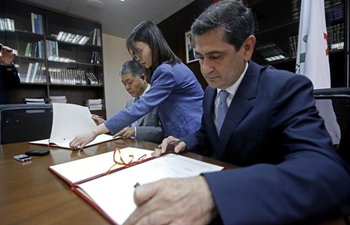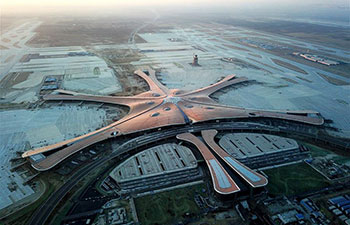
Pedestrians walk past the Reserve Bank of Australia, the country's central bank, in Sydney, Australia, July 2, 2019. For the first time since 2012, Australia's central bank has made back-to-back rate cuts, to set a new record low cash rate of just 1.0 percent. The Reserve Bank of Australia (RBA) Governor Philip Lowe said on Tuesday, the decision was made to stimulate economic growth and "provide greater confidence that inflation will be consistent with the medium-term target." (Xinhua/Bai Xuefei)
By Levi J Parsons
SYDNEY, July 2 (Xinhua) -- For the first time since 2012, Australia's central bank has made back-to-back rate cuts, to set a new record low cash rate of just 1.0 percent.
The Reserve Bank of Australia (RBA) Governor Philip Lowe said on Tuesday, the decision was made to stimulate economic growth and "provide greater confidence that inflation will be consistent with the medium-term target."
While Tuesday's announcement might be good news for the country's mortgage holders, and welcomed by government and businesses looking to borrow money, the decision to slash interest rates to an all-time low does not paint a particularly good picture for Australia's economy at the moment.
Although the unemployment rate Down Under remains stable at 5.2 percent, stagnant wage growth continues to hinder the RBA's ever-dwindling inflation targets.
"Over the year to the March quarter, the Australian economy grew at a below-trend 1.8 percent," Lowe said in the RBA's monetary policy statement.
"Consumption growth has been subdued, weighed down by a protracted period of low income growth and declining housing prices."
This slowdown in consumer spending coupled with one of the world's highest levels of household debt per capita, has many economists concerned that the country's three-decade-long span of consecutive economic growth could soon be coming to an end.
"The Aussie economy continues to face challenges. The end of the residential property construction boom and growing consumer caution are weighing on domestic demand," Commsec Senior Economist Ryan Felsman told investors in an afternoon note.
"Government spending on infrastructure and health care is lending support, but global growth has slowed due to trade protectionism."
Echoing this sentiment, Domain economist Trent Wiltshire said, "we think the impact of lower interest rates will be more muted than in the past because households are heavily indebted and people are wary about taking on any more debt."
"Bank lending conditions remain pretty restricted and because the economy is soft, wages growth is going to remain soft which will put a ceiling on price growth," he added.
While Australia's interest rate is now the sixth lowest in the world, economic experts are already predicting there will be a third rate cut before the end of this year.
"The board emphasised employment growth and the need to stimulate wages growth and therefore price inflation, with an explicit mention of the need to move inflation into the two-to-three percent target band over the medium term," BIS Oxford Economics chief Australia economist Sarah Hunter said.
"We don't think the 50 basis-point reduction will be enough, and continue to expect a third cut to 0.75 percent in the fourth quarter."
With currency markets already pricing in a downward move on interest rates, the Australian dollar was largely unaffected by the announcement of the rate cut.
Immediately following the release of the RBA's statement at 2:35 pm (AEST), the local currency was buying 69.70 U.S. cents.











